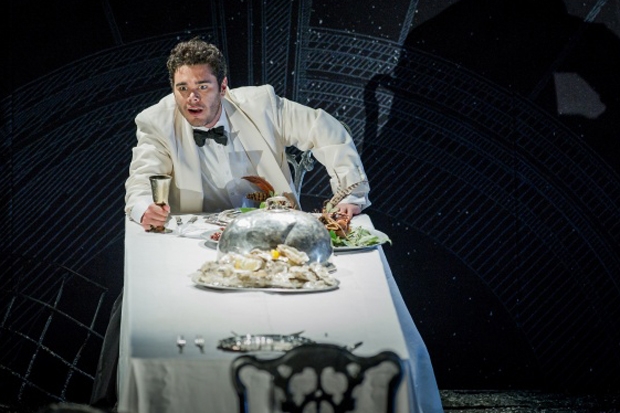‘Don’t you think you’re drinking too much?’ said the nurse, contemplating the array of bottles. ‘But I feel so thirsty,’ I replied. A doctor arrived and concluded that powerful intravenous antibiotics did require a lot of liquid, so that the orange juice was acceptable as well as the water.
The trouble had started at Boisdale. We were having a modest lunch, to taste some new Spanish wines while working out which sherries would accompany haggis. A Palo Cortado from Gonzalez Byass won that prize. We then moved to Ranald’s cigar terrace to reaffirm the partnership between Speyside and Havana. Only problem: I was feeling increasingly wretched and it was showing. For weeks, my leg had been growing sorer. Ranald and the girls insisted that I should go home to bed. ‘Can’t: dining in the House of Lords.’
I did, but was unable to finish the Dover sole: a sinful waste. Only hope that it ended up in a cattie-bag. Matters continued to deteriorate. By Friday, I was unable to help with setting up the picnic at Glyndebourne. My friends caught sight of my leg. Raw and red, it looked as if it had come from the spit next to Don Giovanni’s. The next day, under the strictest orders — and barely able to walk at all — I made my fateful way to St Thomas’s.
I have had little to do with health or hospitals, but when you are feeling wretched and a little worried, a great hospital is a great comfort. The staff here are committed, able, charming and spontaneously helpful. There is an all-pervasive sense of ethos. I know a number of health experts of various kinds — not all trained at Tommy’s — who insist that it is the best hospital in the country. As one of the obvious ways to improve the NHS is the universalisation of best practice, St Thomas’s should be having to ration visits.
‘Best practice’ does not apply to the Glyndebourne Don Giovanni. It is irritating when a not particularly able director is determined to strive for freshness, and ends up with fatuity. One would have thought that it was easier to get Mozart right than wrong. Friday’s performance was unlucky, in that Leporello was ill. Masetto took over. He would have been a good hobbledehoyish Masetto. His successor would have twisted round the minx’s finger even faster than usual. He might just evolve into Don Bartolo. Then again, Zerlina was not minxish enough. What is the definition of a minx? A girl who will settle for mink, with X-rated morals.
The fight between the Commendatore and the Don was a bar room brawl. There was no swordplay. There must be swordplay. The set was initially intriguing. Then it became fussy, then irritating — and ended up as chaotic.
There was no attempt to solve the principal setting problem: the masked scene. Why does the Don run away? One would back the old, arthritic, gallant Commendatore against Don Ottavio. Don Giovanni would have had no problem. After running Ottavio through, he would have had his wicked way in turn with Anna and Elvira, leaving them exhausted as he went after Zerlina. So why the retreat? As ever, faced by an interesting difficulty, our director reduces it to a muddle.
The Don was not strong enough, though the two principal females were outstanding. Even they could not rescue this production, which ought to be put to sleep. Still, Glyndebourne is Glyndebourne. The trees, the sheep me-ehing behind the ha-ha. Late season strawberries, perilously succulent, held back from blowsiness by a scintilla of pepper: cream and clotted cream.
Finally, someone had brought a half of Yquem ’99. That was succulence. It is a Mozartian wine. I had austerity to come. I suppose I might try arguing that noble rot could be a way of tackling the ignoble rot in my lower leg, but that does not sound very medical to me.






Comments